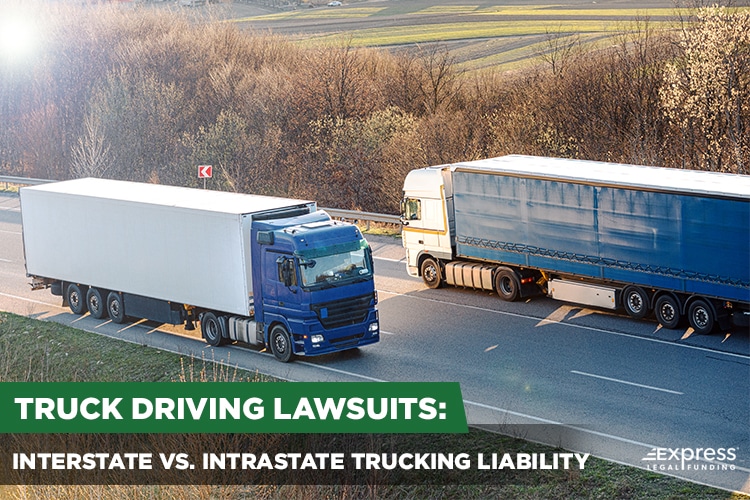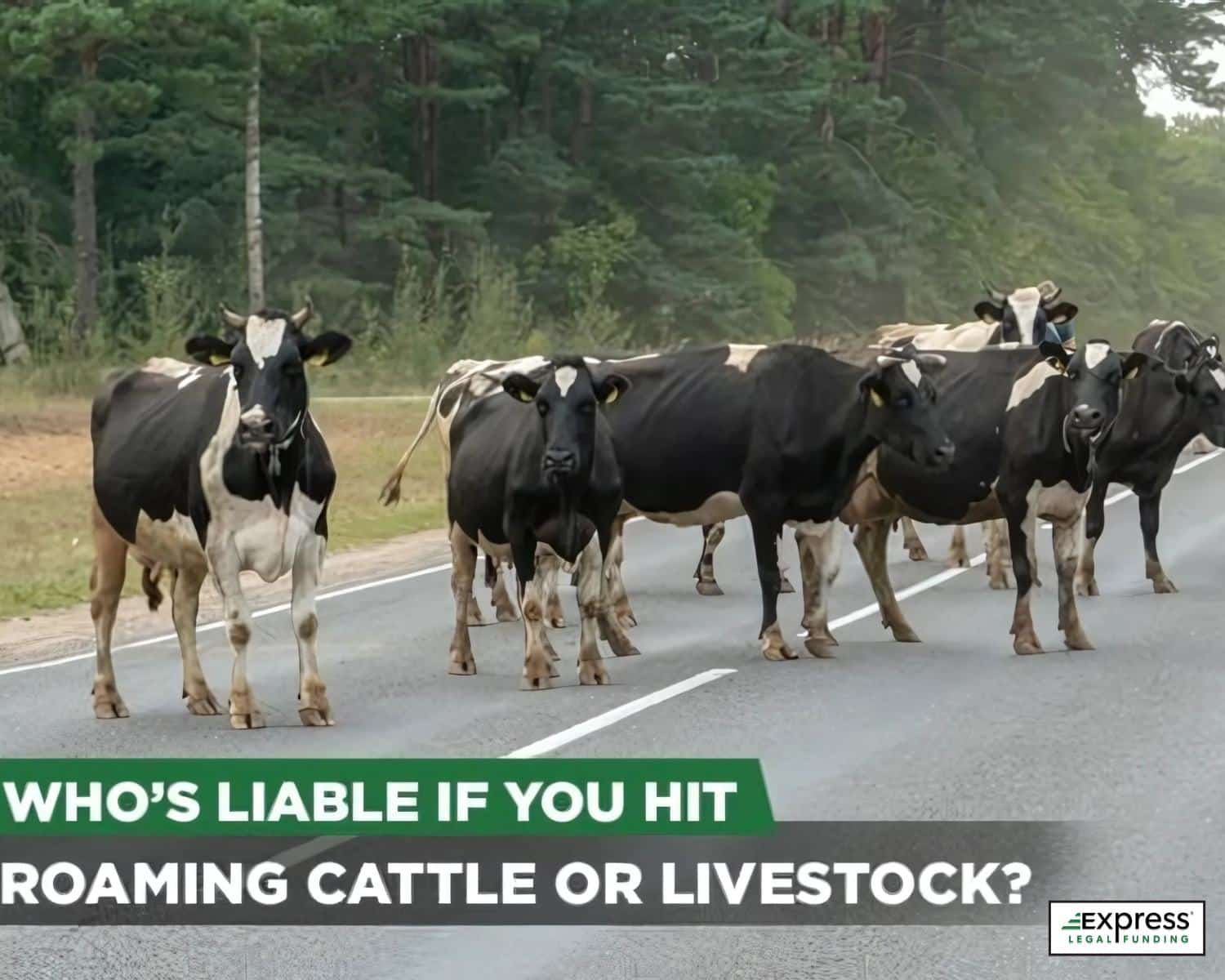
Welcome to our guide, where we discuss and explain who is responsible for hitting a cow or livestock in a car accident.
Livestock and farm animals have been critical to the human species since our ancestors first domesticated them, dating back 10,000 years.
Before then, prehistoric humans relied on hunting wild animals and gathering their food.
While the days of woolly mammoth hunts have long passed, farm animals remain one of our most important sources of food and raw materials, which, in contrast, require no hunting.
For most of us, all we need to do from our end is make a trip to a local grocery store. Still, meat, milk, and leather do not magically find their way to your grocery market freezer aisle or store shelves.
Whether you live in a bustling urban city or a small town, we all rely on livestock owners and ranchers to breed and raise farm animals we need for food and materials.
This process of breeding and raising livestock and farm animals, such as cows, goats, pigs, and sheep, is known as animal husbandry.
The land is one of the most vital concerns that ranchers and livestock owners have for raising their cattle. Access to large amounts of land is, essentially, a requirement for cattle ranchers to be successful.
They need enough land for their herds of cows to graze on the grass for nutrition without running out, as it takes time for the grass to grow back.
Often this means thousands of acres owned by a single rancher or farm. This need for land is why ranches are impractical to be located inside cities.
These seemingly endless fields on the horizon are typical of lesser populated regions, which many people associate with long car trips.
Traveling by motor vehicle between states, whether for business or vacation, can be more affordable than airfare and offer a chance to see new locales.
However, besides taking longer than flying, it often leaves only one viable route option in farm and cattle regions: driving on the interstate and rural state highway systems.
These highways and roads bring potential danger besides the standard risks of other drivers, bad weather, and mechanical trouble as they often intersect with the property lines of cow farms and cattle ranches.
This proximity between the rancher’s land and the highways puts people at risk of getting into a car accident by hitting a cow or another farm animal roaming on the road.
Car Accidents With Roaming Livestock and Cows
Motor vehicle livestock accidents can result in serious injuries or even death for the driver of the car and their passengers. Collisions with large animals happen every day across the United States and have among the highest fatality rates among car accidents.
According to the Insurance Institute for Highway Safety, 66% of animal-involved crash deaths in 2020 resulted from a direct collision with an animal. So the threat and danger are real.
However, the questions we will answer in this article are: If you are driving and you hit a cow, who is legally responsible for paying for the car accident? You, as the driver or the cow’s owner?
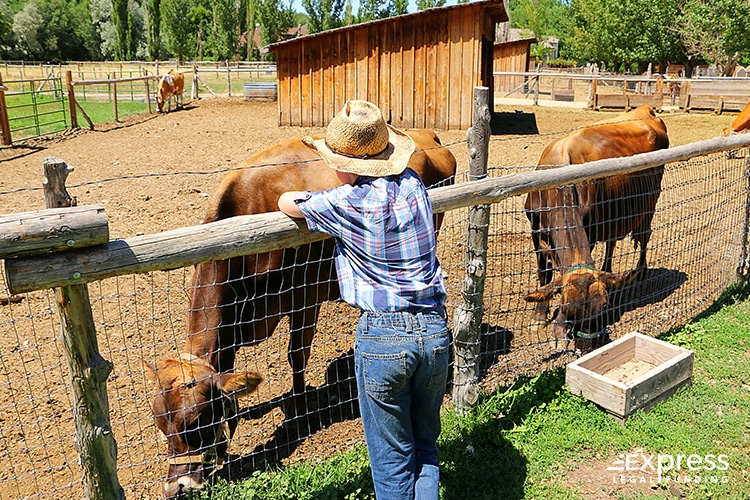
“Fence Laws” for Cattle and Livestock
The livestock on a rancher’s property is their livelihood. Without their livestock, animal farmers have no source of income. So it is in their best financial interest to use fences to safely contain their cattle and farm animals to protect them from harm.
Well-placed fences keep cows from roaming onto and getting hit by cars driving on the road as both the cow’s owner and driver in the car accident can face legal issues.
These and other legal implications, like cattle roaming onto a neighbor’s property, led all 50 states to pass “fence laws,” which are statutes to address fencing requirements for livestock owners.
All 50 States Have “Fence Laws” for Livestock and Animals
These agriculture code “fence laws” are unique to each state and provide the exact legal requirements for what fencing is required for ranch owners to keep their livestock on their land.
The statutes include guidelines that pertain to who is responsible for car accidents caused by hitting livestock wandering on the road.
“Fence laws” can be very detailed and provide instructions for where and how livestock owners are required to build outside fencing on their property.
Some subsections of the fence rules address the dimensions, materials, and location of specific domestic animal types. For example, the construction of barbed wire and wood fences to contain cows that we are accustomed to seeing on road trips are described in these state laws.
These laws and the fences they require effectively reduce car accident incidents caused by hitting livestock and other legal issues like having your neighbor’s cows on your property.
Still, like many laws going from state to state, the states wrote the “fence laws” with different objectives in mind.
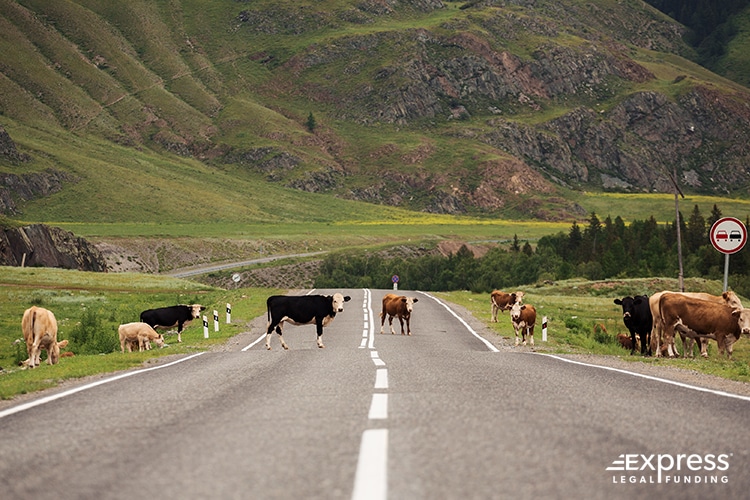
What are Closed-Range Law States?
The definition of closed-range law states is the states that have laws requiring cattle ranchers and livestock owners to maintain fencing (fence-in laws) to keep their cattle on their property.
This also makes it so that it is easier for cow owners in closed-range states to be held liable for the damage their domesticated animals cause when they wander off their property.
Livestock Owner Liability in Closed-Range States
This legal concept of livestock owner liability and closed-range laws are held in most of the eastern states and are a continuation of the original English common law.
However, not every state enforces fence laws that make the owners of the animals liable. Instead, they institute laws with the opposite effect that allow for what is called the “open range.”
What Does the Open Range Mean?
The legal definition of an open range is land where cattle are legally allowed by state law to roam freely and graze grass without concern about who owns the land.
Open-range laws favor ranchers and livestock owners by not making them liable to contain their cattle behind fences on their property lines and off public roads.
Instead, it falls on the private property owners to build fences if they want to keep livestock from straying onto their land. The states with open-range laws are mainly in the western and midwestern United States.

The open range land first came into effect in 1866 for the Texas cattlemen who herded their cattle annually north for slaughter through a handful of states, including Nebraska, Kansas, South Dakota, and Wyoming, among others to the west.
Although many open-range laws have been modified or limited to certain areas to account for increased city populations, they are still in effect as the cattle ranching industry is crucial to many states and regions.
In some states like Nevada, open-range laws go a step further. They include rules making specific property owners liable for building and maintaining proper fences to keep cows off their property.
These laws even enable the livestock owners to sue the property owners if injury befalls their cow on the property.
“Fence-Out” Law States
These laws in open-range states are referred to as “fence-out laws,” as it is the job of specific property owners to keep cows in the open range from coming onto their property.
Nevada’s “closed fence laws” include requirements for railroad companies to have fencing to keep cattle off the railroad tracks, and the cow’s owner can sue them in the event a train hits a cow on the tracks.
Open-Range Laws Have Requirements for Cattle Owners Like Road Signs
Still, even states with open-range laws have requirements to mitigate the risks posed by cattle freely roaming on the open range.
For example, keeping their cattle off state and federal highways and warn drivers by posting “open-range road signs” to be placed along public roads adjacent to their land.
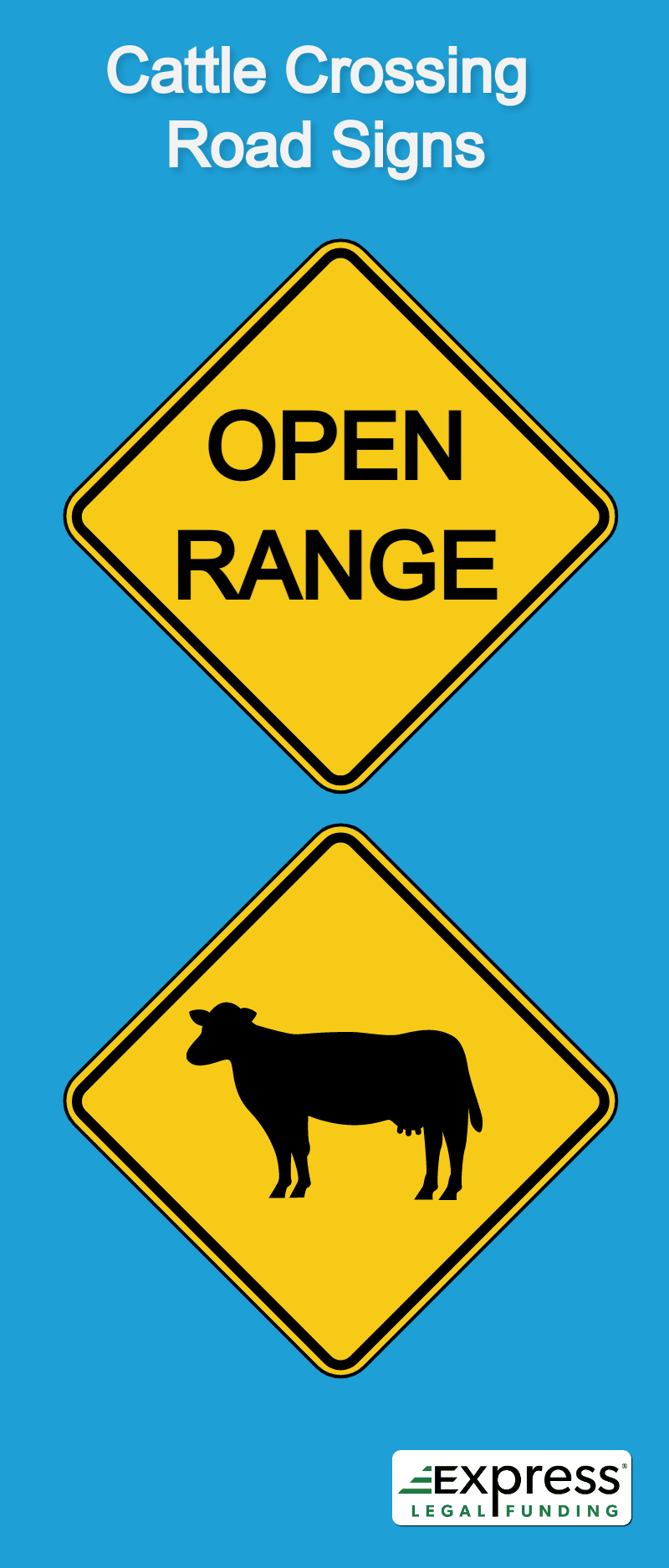
Despite these laws and precautions, there is a real possibility for people to suffer auto accidents involving livestock, and rarely are they mere fender benders. More often than not, these crashes lead to serious personal injuries for humans and almost always lead to killing the hit animal.
Domesticated animals, specifically cows, have become increasingly docile and have significantly lost the survival instinct to fear danger. With that, the cows do not realize the risks of getting hit by motor vehicles, and they should keep off the road.
However, that does not mean we do not have anyone to for a car accident that involves hitting a car. As mentioned before, common law addresses this issue and classifies a cow as being a cow owner’s personal property.
So unless otherwise specified, the owner is responsible for the tort inflicted upon a person. That includes those caused by their property.
However, personal injury lawsuits and being made to be held civilly liable are never straightforward, as things like proving negligence, liability, and additional defendants often come up.
So when it comes to livestock accidents involving cars and cattle on road laws, the question is: who is responsible for paying if your vehicle hits a cow?
Who is Liable if You Hit a Cow With Your Car?
Determining who is liable to pay if you get in a car accident by crashing your car into a cow will depend on the specific laws of where the accident happened and can’t be answered generally.
However, it is significantly more likely that the livestock owner would be responsible for paying for the car accident caused by their being in a closed range state than in a state with open range laws.
If the Car Accident With the Cow Was on a Federal or State Highway
The situation changes drastically in your favor as the driver if the animal wanders onto a federal or state highway.
Those highways provide you, the driver, the most definitive levels of protection as there is the requirement for livestock owners to keep their cattle off those roads is the highest as those areas are where the rancher is expected to corral them away from the road.
Still, ranches in open-range states like Texas are likely to build fences in strategic positions, even when not required to, as a way to prevent incidents of their livestock entering state and federal highways.
“Fence-In” Law States
In states where “fence-in” laws are in place, the ranchers must maintain barriers that limit their livestock’s range of movement.
“Fence-in” laws ensure the livestock does not present an immediate threat to drivers on the road near their land. In some states, this may be a simple barbed wire fence; in others, this may be a more comprehensive enclosure with posted signs.
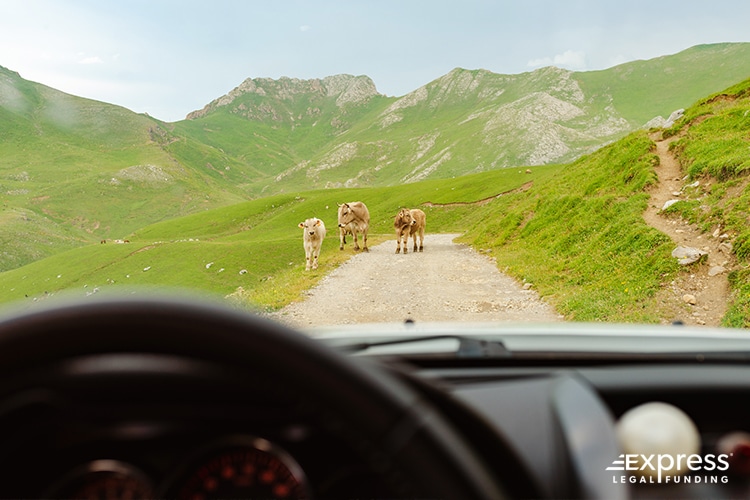
Where it gets problematic and why you would always want to speak with a personal injury lawyer and have a free consultation before determining if you have a case or not is that each state passes its own statutes to determine the exact nature of how state fence laws are enforced.
That means every state has unique laws that might radically differ from the neighboring state. A livestock accident in Nevada could be incredibly different from the same case in Texas. For example, the fence laws in Nevada cite provision 568.360, stating the following:
1. No person, firm or corporation owning, controlling or in possession of any domestic animal running on [the] open range has the duty to keep the animal off any highway traversing or located on the open range, and no such person, firm or corporation is liable for damages to any property or for injury to any person caused by any collision between a motor vehicle and the animal occurring on such a highway.
2. Any person, firm, or corporation negligently allowing a domestic animal to enter within a fenced right-of-way of a highway is liable for damages caused by a collision between a motor vehicle and the animal occurring on the highway.
That means Nevada ranchers are only obligated to prevent their livestock from entering areas fenced off by state ordinance. Any livestock struck while traversing these fenced areas is the rancher’s responsibility and, therefore, liable. These laws are similar to those in Texas, albeit with slight variances.
Local Stock Law Elections in Texas
In Texas, it goes one step further when it comes to how different the open-range laws can be, as the Texas state legislature passed statutes in 1876 to allow Texas counties to hold an election to determine what open-range laws they want to keep for specific animals.
These optional elections can result in the passage of local stock laws. The choices are required to be written as either voting “for” or voting “against” an animal being included in open-range laws.
The list of animals that can be voted on in Texas local stock law elections includes:
- Horses
- Mules
- Jacks
- Jennets
- Donkeys
- Hogs
- Sheep
- Goats
What if Your Car Hits Livestock on the Rancher’s Property?
Even as the driver, you can be held liable for hitting a cow with your car as you would for damaging someone’s property. Laws have long existed that allow livestock owners to file legal claims against people who harm or kill their livestock.
Those same laws remain in effect today and are part of the agricultural codes that make it illegal for us to interact with livestock without permission from the owner of the animal.

Similarly, when a motor vehicle enters an area controlled by the rancher or areas protected by “fence laws,” the farm animals are afforded legal protection.
Any harm that comes to livestock grazing on the rancher’s property due to a driver pulling off the road and driving onto the farmer’s property is the driver’s fault.
This ensures that someone else’s reckless driving and trespassing do not compromise the rancher’s livelihood. The livestock owner can sue the driver who crashed into their cow for the money they lost due to the accident. As always, there are exceptions to these rules.
If You Hit the Cow On Purpose
However, depending on the circumstances, there could be more than civil repercussions for the driver who hit the cow. When the police arrive at the crash scene, they will likely evaluate the location.
If the crash happened far into the farm’s property, the police would be inclined to suspect that crashing into the livestock was intentional. The charges associated with intentionally crashing into livestock on ranch property can carry prison sentences.
Unfortunately, comparing and contrasting each state’s fence and open-range or closed-range laws in one article is virtually impossible.
From a general perspective, the following questions concerning the state laws can help determine who is liable for your loss that resulted from your crashing your car into livestock:
- On what type of road did the collision occur?
- Do the state’s laws require the rancher to maintain fencing?
- Did the rancher have the proper fencing, but the animal bypassed it?
- If the fencing was broken, was the rancher aware of it?
- Did the driver intentionally strike the animal?
These are questions that the police, the owners of livestock, the law firms, and the auto insurance companies will have. If you were involved in a collision with livestock and the rancher is at fault, the next question should be: What to do next after you get in a car accident by crashing into a cow?
The answers to these questions will determine whether you or the rancher is liable for the collision and help you decide on your next move.
In most cases, it is best to confer with an attorney on the subject to better understand your state’s laws on these collisions. Although, retaining legal advice from a law office is optional (but recommended).
What Should You Do After You Hit the Cow That Caused the Car Accident?
When you are involved in a motor vehicle accident, there is a lot of confusion, pain, and emotions that pollute the event. These sensations and feelings can be amplified when you throw a 1,500 lb. animal into the mix.
Despite being animals, cattle are surprisingly wall-like in a high-speed car accident and can do just as much damage to your car as your car does to it.
Even a collision that kills the cow can lead to the driver’s death, depending on the force of the collision, though death is rare in car crashes. Nevertheless, if you hit a cow with your car, it’s unlikely that you will walk away from the accident unscathed.
The next step after calling the police and getting medical treatment is determined by the state’s laws about these collisions and whether the crash was intentional.
In states where fence-in laws are in place, or an open-range cow finds itself on a fenced-off federal highway, the liability for the car accident is more likely the rancher.
In circumstances where the livestock owner is liable for the accident, the human victims involved in the collision can file a negligence lawsuit.
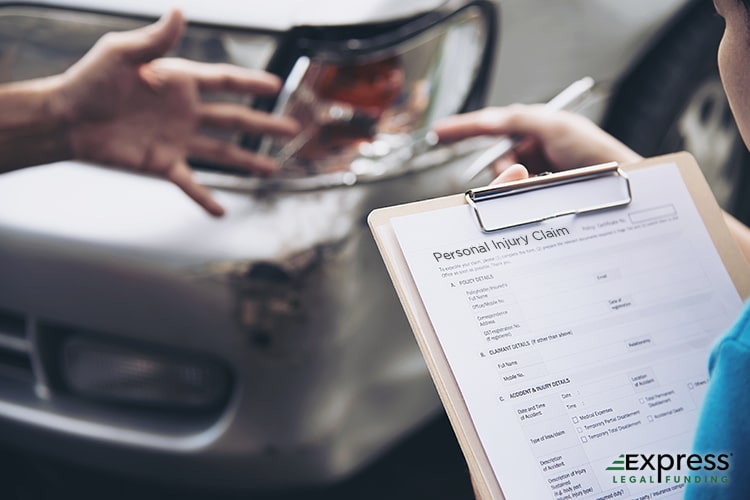
Negligence Lawsuit Against the Livestock Owner
The civil suit against the rancher filed by the car accident victims will cite negligence for failure to uphold the duty of care, which was to keep the cow off the road.
There could be more than one way the rancher who owned the cow that got hit was negligent, but the critical part for the injured plaintiffs filing the suit is they can prove there was negligence on the part of the cow’s owner.
These collisions can cause serious injuries that require immediate and intensive medical care. The civil claim the victims are allowed to file is a personal injury claim designed to help them recover financially from the financial toll of physically recovering from an accident between a cow and a car.
In addition to the damage to your vehicle, which will likely be determined totaled by an insurance adjuster, you will likely incur costly medical and car replacement expenses. Fortunately, if you are able to file a personal injury claim against the rancher, you can recover financially from these costs you spent recovering.
In Open-Range Car Accident Claims, It Can Be Difficult to Hold the Cattle Owner Liable.
These cases are from being straightforward, and the situation is flipped against you if the collision occurred on authorized open-range land or suspected to be intentional.
In these circumstances, even the best car accident lawyers will have a hard time holding the rancher responsible for your injuries or damage to your vehicle.
Ultimately, a personal injury attorney may tell you that the cow’s owner is not responsible. Instead, in the worst-case scenario, the rancher could sue you for the destruction of their cattle and the profits they lost due to that property damage.
While there might be a good reason you could not prevent the auto accident, it becomes your responsibility when the livestock is harmed on the open-range territory.
In some states, that means it is your responsibility to pay the cow’s owner.
While there is little you can do when the collision occurs in an open-range state, your civil rights are still honored in closed-range states with “fence-in” laws.
Unfortunately, personal injury claims can be a complicated endeavor, which gets even more complex for cases that involve you getting into an accident by driving your car into a cow.
Complex legal claims take more time, meaning longer wait times to get financially compensated via a settlement.
Closing Statements: Who is Responsible for a Car Accident Where You Hit a Cow
Livestock is an expensive and essential resource for both ranchers and consumers since we would lack a significant food and material supply chain source without it.
For most of us, it is a convenient source of food and material goods, but for the rancher, it is their livelihood.
As people living in the twenty-first century, we are busy and quick to fall into “out of sight, out of mind” thinking, so we seldom consider the importance of cattle ranches in our daily lives. Every time you order a hamburger or sit on a leather seat, their significance remains high.
Combined with the significance of livestock for the US economy, it is not surprising that the federal and state governments take steps to protect these ranches as much as the citizens living near them.
Still, even with those protections and open range laws, many circumstances allow us to file a viable claim for a livestock accident that resulted from a rancher’s negligence. In doing so, we are exercising our legal right to seek civil compensation.
Unfortunately, depending on your injuries, the complexity of your case, and the defendants, that can be a multi-year process.

Unfortunately, injury claims can be associated with unforeseen costs like medical treatment and car repairs that can be debilitating in their own right.
Pre-settlement Funding for During Car Accident Lawsuits
We at Express Legal Funding understand this about car accident lawsuits and other injury claims, and that is why we can provide you with pre-settlement funding. So with approved lawsuit funding, you do not have to put the cost of living and paying your bills on hold during your civil claim.
That’s because we, the legal funding company, can advance you some cash to use now in exchange for a portion of your potential settlement or trial award money you and your attorney expect to recover from your claim in the future.
When approved for pre-settlement funding, it makes it so that you can get some money now and later when your case successfully ends, and because the money is advanced against your claim and not you, the plaintiff, it is not a loan. It’s risk-free.
So if you go to court but unfortunately lose your suit, the money is yours to keep. That is what makes it non-recourse funding and not a loan. The financial risk is on us, the funding company, and not you, as no lien is placed on the legal funding client.
(It is crucial to note that the cash funds we can provide to injured and damaged plaintiffs in Missouri are a recourse loan and, therefore, not risk-free advances against potential case proceeds.
Pre-settlement loans in states like Missouri are loans and must, technically by law, be repaid. Express Legal Funding-Missouri, LLC is a lender licensed to offer loans in MO.)
So if you were driving on the open range and hit a cow and need to apply for a lawsuit cash advance during your claim or have another type of personal lawsuit, you can visit our website to apply online or call us anytime.
You can learn more about how pre-settlement funding may be a good financial option via the Express Legal Funding Blog or apply online to start the process now!
FAQs on Livestock Car Accidents: Understanding Driver and Cow Owner Liability
What happens if I hit a cow with my car?
If you hit a cow with your car, it can result in serious injuries or even death for you and your passengers. Collisions with large animals like cows happen every day across the United States and have among the highest fatality rates among car accidents.
As for who is legally responsible for paying for the car accident, it depends on the “fence laws” in your state. In some states, livestock owners (cow owners) are responsible for keeping them contained. If the cow was not adequately secured and wandered onto the road, the owner may be liable for the damage to your vehicle.
In other states with “open range” laws, cows are allowed to roam freely, and the driver might bear more responsibility for avoiding the animal.
In either case, it’s critical to contact the police and your insurance company immediately after the accident. If the cow’s owner is found to be at fault, their insurance may cover the damages. If you are found to be at fault, your insurance may cover the damages, depending on your policy.
Additionally, it’s vital to seek medical attention immediately if you or your passengers have been injured in the accident, even if you don’t think you’ve been seriously injured.
In summary, hitting a cow with your car can have serious consequences, both in terms of physical injury and legal responsibility. It’s essential to be aware of your state’s fence laws and to take appropriate action if you are involved in such an accident.
Can I sue the owner if I hit a cow with my car?
Yes, you may be able to sue the owner of the cow if the accident was caused by the owner’s negligence in containing the animal. In states where livestock must be properly fenced, owners can be held liable for damages if their cow wandered onto the road due to a failure to contain it.
However, in states with “open range” laws, livestock owners are generally not responsible for accidents involving free-roaming animals, making a lawsuit more difficult.
What are open range laws, and how do they affect liability?
Open range laws allow livestock, such as cows, to roam freely in designated areas. If you hit a cow in an open range area, the livestock owner typically isn’t held responsible for the accident, and liability might fall on the driver instead. It’s important to check local laws, as liability will vary depending on your location.
What should I do if I hit a cow with my car?
If you hit a cow with your car, follow these steps:
- Check for injuries and seek medical attention: Ensure that you and any passengers are safe. Call 911 for emergency medical help immediately. Some injuries may not be immediately noticeable, so it’s important to get checked even if you feel fine.
- Move to a safe area: If possible, move your vehicle to the side of the road to avoid further accidents.
- Call law enforcement: Report the accident to create an official police report. This is critical for insurance claims and potential legal actions.
- Document the scene: Take photos of the accident, including damage to your vehicle, the cow, the road, and any relevant signs or fences.
- Contact your insurance company: Notify your insurer to file a claim, especially if you have comprehensive coverage, which typically covers animal collisions.
Does car insurance cover hitting a cow?
It depends on your insurance policy. Most comprehensive car insurance policies cover animal collisions, including hitting livestock like cows. Check with your insurance provider to see if your policy includes this coverage.
What evidence do I need to sue the cow’s owner?
To successfully sue the livestock owner, you’ll need to prove liability and negligence. Evidence that can help includes:
- A police report documenting the accident.
- Photos of the scene and the cow.
- Witness statements.
- Proof that the owner failed to properly contain the animal, if applicable.
Should I consult an attorney if I hit a cow?
Yes, even if you don’t have reason to believe the livestock owner was negligent, consulting with a personal injury attorney after the accident is recommended. They can answer your questions about your legal options, help evaluate your case’s details, guide you through local laws, and help you seek compensation for damages and injuries you suffered.

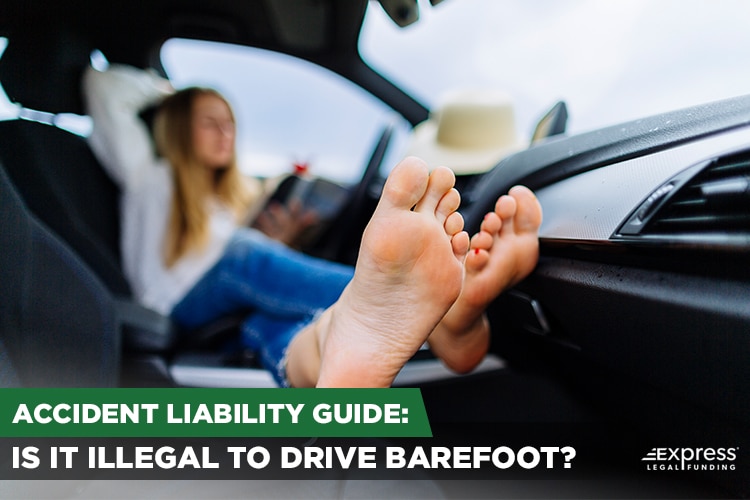
![[Guide] Which States Have Dram Shop Liability Laws?'s featured image](https://expresslegalfunding.com/wp-content/uploads/2022/02/Dram-Shop-Liability.jpg)
